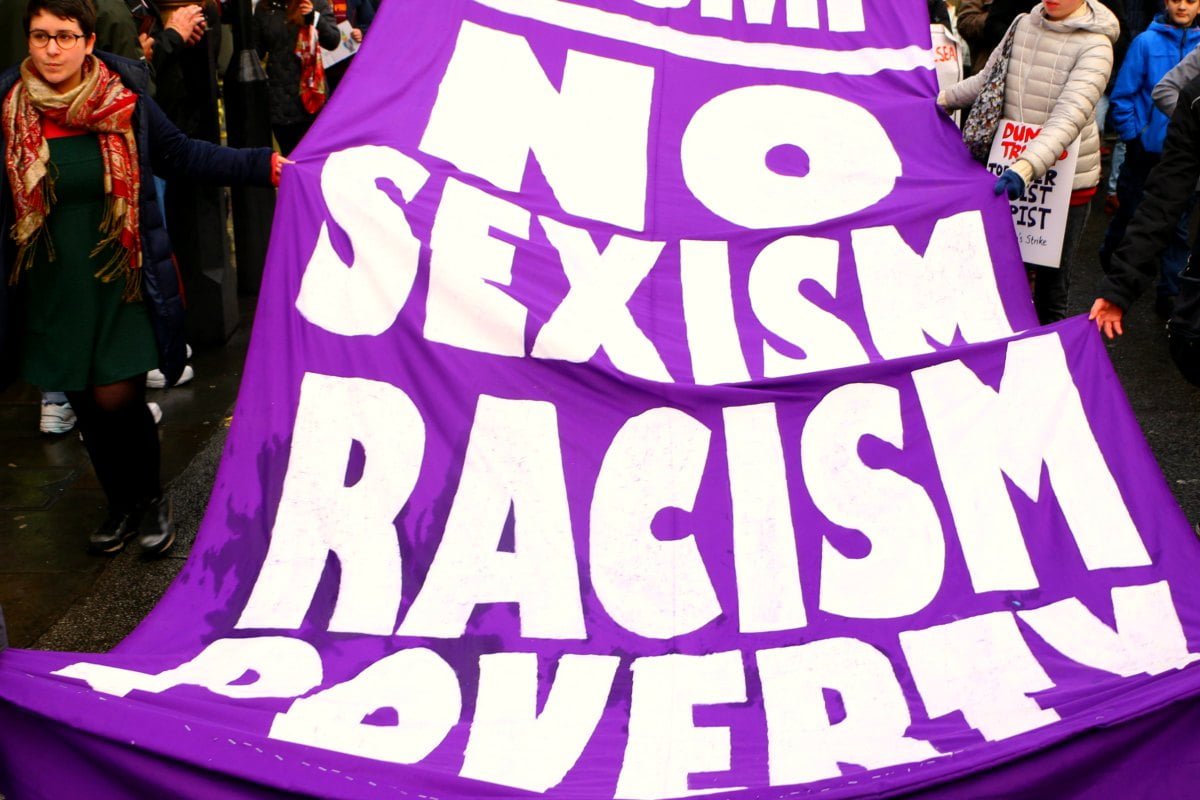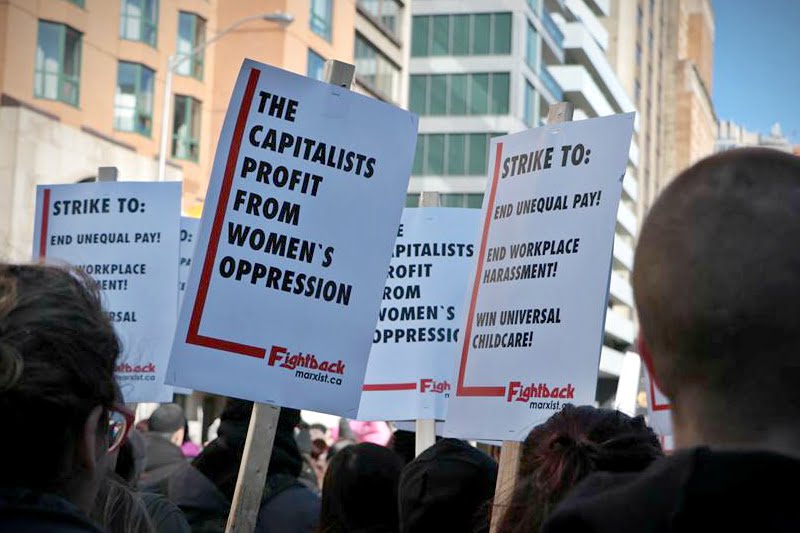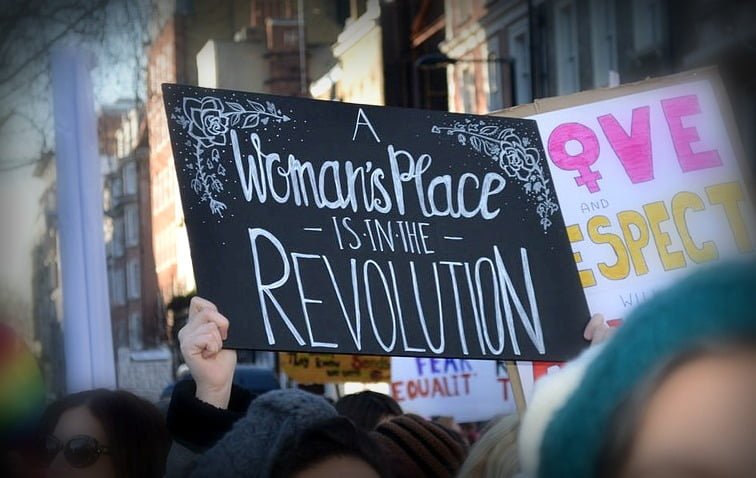The issue of abortion laws in Northern Ireland has shown where the loyalties of establishment female politicians really lie.
Back in November 2006, the Fawcett society, a women’s rights campaigning organisation, posted a series of photos of influential political figures posing and wearing t-shirts that declared: “this is what a feminist looks like”. Amongst those photographed was Theresa May, then the shadow leader of the House of Commons.
Fast forward 12 years, and this image now looks like a sarcastic joke. May leads a Tory government that has launched a massive attack on working class women, who have been hit the hardest by cuts to wages, benefits, and services. Millions of working women are finding it increasingly difficult to make ends meet in Tory austerity Britain.
Events in Ireland have underlined how little the Prime Minister really cares about the lives of ordinary women. Following the massive vote in favour of abortion rights in the Republic of Ireland, pressure is mounting on May to follow suit and remove restrictive abortion laws in Northern Ireland.
Labour’s Shami Chakrabarti, writing in the Daily Mirror, challenged the PM to “stick up for all women all over the world and not just women we meet at parties”. But hell will sooner freeze over.
Hang together
Even senior Tories – such as Amber Rudd and Justine Greening – are questioning their leader on this issue of abortion rights, causing ruptures within the Conservative Party.
During a debate in Parliament yesterday on abortion law reform in Northern Ireland, the official party line from Karen Bradley, the Northern Ireland secretary, was that any change must come from the Stormont government in Belfast.
This was quickly contradicted by Penny Mordaunt, the women and equalities minister, however, who threatened political leaders in Northern Ireland’s with a tweet asserting that, “if you don’t [act on decriminalising abortion], we [Westminster] will”.
But the Prime Minister’s hands are tied as a result of her Faustian pact with the reactionary DUP, a party who – as well as denying climate change and objecting to same-sex marriage – are firmly opposed to giving women the right to choose.
DUP politicians have been adamant that they will reject any attempt to change Northern Ireland’s abortion laws. Meanwhile, Arlene Forster, the DUP leader, has dismissed the significance of the referendum result in the Republic of Ireland in relation to the backward situation facing women north of the border.
And this is not even to mention the opposition from within the reactionary ranks of the Conservative Party itself, which harbors many outspoken critics of abortion, such as Jacob Rees Mogg.
With May forced to rest on a precarious alliance with the DUP troglodytes, it is unlikely that she will be making concessions on abortion rights any time soon. To do so would pose an existential threat to her minority Tory government, opening the door to another general election and the possibility of putting Corbyn in Number 10.
Such a prospect is anathema to the ruling class. The reactionary establishment would therefore rather hang together than hang separately.
Instead, we have been assured by the Prime Minister that this is an issue for Stormont, the Northern Irish Assembly.
Only there’s one small snag: this regional government has been left to rot for the last 16 months, ever since the collapse of the power-sharing agreement between the DUP and Sinn Fein in January 2017. And it doesn’t look like the Belfast government is going to come back from the grave any time soon.
So much for sisterhood
 The issue of abortion laws in Northern Ireland has therefore starkly highlighted the fact that the question of women’s liberation is, at root, a class question. Establishment female politicians like Theresa May and Arlene Foster will always represent the interests of their class, rather than that of their so-called sisters.
The issue of abortion laws in Northern Ireland has therefore starkly highlighted the fact that the question of women’s liberation is, at root, a class question. Establishment female politicians like Theresa May and Arlene Foster will always represent the interests of their class, rather than that of their so-called sisters.
This was also acutely demonstrated by the recent ‘feminist strike’ in Spain. Hundreds of thousands of women – and men – came out onto the streets on 8th March, International Women’s Day, to demand an end to the gender pay gap, sexual harassment, and domestic violence.
Production was shut down for the day, with the strike prepared for in advance through grassroots mobilisation and organisation. Picket lines and protests sprouted like mushrooms in towns and cities across the country. Women workers were supported throughout by their male comrades.
But what was the position of female representatives of la casta – the establishment – towards the strike? They opposed the movement, of course, with the right-wing Ciudadanos party releasing statements along the lines of “obviously we support women’s rights, but we can’t support these protests because they are anti-capitalist”.
The more explicitly radical and left-wing in character the strike became, the more firmly the right-wing parties opposed it. For many participating in the strike and demonstrations, it was clear that what is required is a fundamental change in society: a revolution. And for a revolution to take place, women must play a central role.
This revolutionary sentiment to the women’s movement in Spain was only reinforced by the subsequent La Manada (‘Wolfpack’) affair, where a gang of brutal rapists were let off lightly by the upper-class, chauvinist Spanish judiciary.
This served to highlight for millions, once again, the link between the reactionary establishment and the oppression of women. For the tens-of-thousands of young people and workers who gathered to protest this horrific decision, the Manada scandal has further emphasised that the fight against oppression and exploitation ultimately requires a fight to overthrow the whole rotten capitalist system.
Revolutionary mood
 The impact of the Irish referendum and the 8th March strike in Spain are being felt across the world. The women’s march against Trump in the USA had a similar international effect.
The impact of the Irish referendum and the 8th March strike in Spain are being felt across the world. The women’s march against Trump in the USA had a similar international effect.
These recent examples are a reflection of a mood developing within society – a revolutionary mood of anger and opposition to the crumbling, conservative pillars upon which capitalism rests. And everywhere this growing rebellion against the old order is accompanied by struggles against oppression, injustice, and inequality.
To achieve the full equality and liberation of women, these struggles must unite together against the oppressive, exploitative system that is responsible for fomenting sexism, prejudice and division.
Only a united, mass, revolutionary struggle of the working class – of women and men – to overthrow capitalism and create a socialist society can bring about the emancipation of women once and for all.







